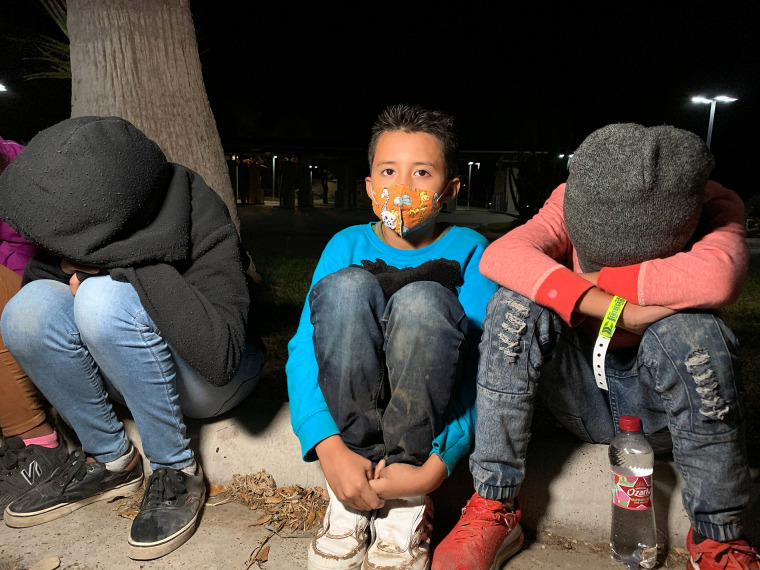ROMA, Texas — They represent a big challenge to the Biden administration as it grapples with the ongoing issues on the nation's southern border: unaccompanied minors — children and adolescents who come to the United States alone or without any immediate family member.
Some arrive with a name they have memorized, a phone number written down on a piece of paper, or a U.S. state they know by heart: the place where their father or mother now lives.
What many do not have is a physical memory of that parent, who left when they were young or before they were born.
The migration of these minors — some as young as 5 and others who are in their teens — is the cause and consequence of migration itself: First their parents emigrated, and now they've come to the U.S. to reunite with their families.
There are currently almost 16,000 minors in the custody of U.S. authorities, 4,878 in Border Patrol facilities and 10,800 more in the care of the Department of Health and Human Services, according to official data collected by NBC News. They are waiting to be released with a family member or sponsor in the United States.
We spoke to some of the children and teens, all Hondurans, after they crossed the Rio Grande and into Texas.
"I miss my mom"
"Have you been scared?"
"Yes."
"Why?"
"Because I miss my mom. I've never been away from her."
Justin, 10, has been in the U.S. for half an hour. He is sitting in a parking lot with 10 other unaccompanied minors. The Border Patrol separated them from a group of about 75 migrants who entered at night through Roma, Texas.
Justin says he made the trip alone, without relatives, but traveled with three men he met during the journey. They traveled mainly by car and, at one point, by plane, between the Mexican cities of Puebla and Monterrey.
"They are some friends that I found and I stuck with them," he said. One of them broke away before crossing the river; adults often try to avoid the Border Patrol. He does not specifically point to the other two, but indicates with his eyes that they are in the group of adults with children on the other side of the parking lot.
In his pocket, Justin carries a slip of paper with the phone number of his father, who lives on the East Coast. He also knows it by heart and can recite it without thinking.
"How long have you not seen your daddy?"
"I don't know him."
"And what are you going to do when you see him?"
"Give him a hug, give him a kiss."
He's barely been able to let his mother back in Honduras know how he's doing. "I have a phone but it works only with Wi-Fi."
He said his father told him that he was coming soon, so he shouldn't be sad. When we finished speaking, he rested his head between his knees again. It's midnight.
"My mother told me she wanted to see me"
Keiner, 11, has not seen his mother, who lives in Florida, since he was 4 years old. He's clear about why he took the weekslong journey from Honduras to Texas. "My mother told me she wanted to see me," he said.
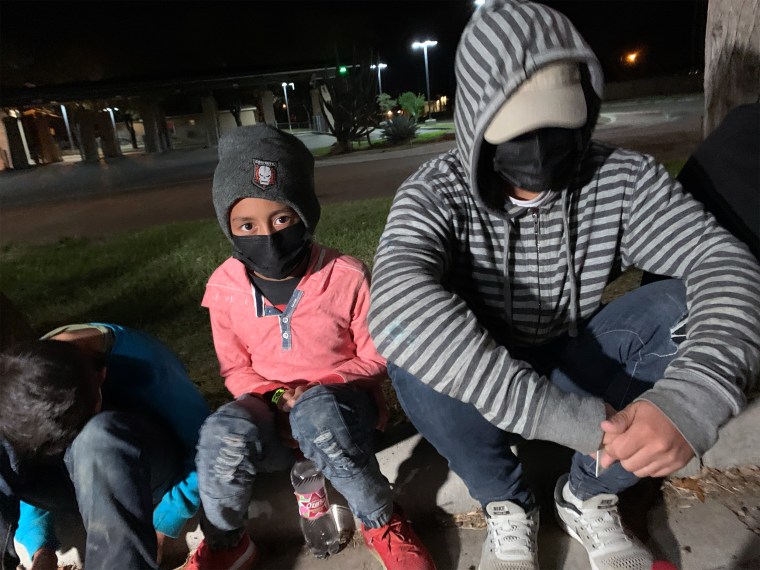
Keiner remembers the moment when his life took a turn. “I was there playing with friends, and my aunt told me, ‘You are leaving for America tomorrow.’ I was thoughtful and said, ‘With whom?' 'With your uncle.’ ‘Ah.’ Then I went to play.”
His uncle, José David, at 17, is also a minor. He is sitting next to him.
“I can withstand more, I'm bigger, but I brought medicine and a bottle of water for him; he had a fever three times along the way,” José David said as he waited for Border Patrol to take their information. With the money they had brought, they were able to pay for food all the way to Monterrey, Mexico, but after that they had to ask for food.
José David says that they crossed the Rio Grande by raft and without paying the extortion money to the cartels who control the area.
“I told them if they would do me a favor, for him," said José David, pointing to Keiner. "And they told me: 'I'll do it for him, not for you.' Thank God they did us the favor of helping us cross.”
"I haven't seen my mom for 10 years"
The worst thing about the trip to the United States was riding the freight train known as La Bestia, said Franklin, who's 16. “When we climbed up on the train, our feet were frozen. You suffer a lot. We were like four hours. I felt so sorry for my brother.”
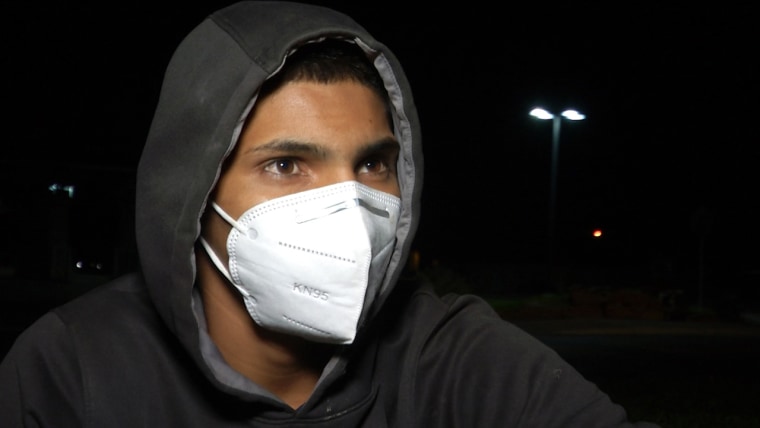
His brother, 14, listens to him with his head on his knees and with the hood protecting him from the night chill. They took the journey together, like so many other things since they were kids.
“We lived alone. I was in charge of my brother. We slept alone, we lived alone, we only went to a girl's house to eat. My mother sent money from the United States," Franklin said. "We have missed her so much. When we talk to her, when she looks at us, she starts to cry. It's hard."
Ten years have passed like this. “From one day to the next, she [my mom] told us to get things ready and that we were going out. And we listened to her, we got things ready and the next day we went out."
They grabbed toothpaste, a toothbrush, a first-aid kit, clothes, flip-flops and a cellphone. Their belongings have now been put inside a plastic bag with the logo of the Department of Homeland Security and Franklin's name written in marker. Inside it, only the phone and a charger remain.
"I want a future for myself"
Michelle, a 17-year-old from Honduras, has never hugged her father. She imagines that it will be “exciting” to do so, probably in the next few weeks, if authorities release her to him. He lives in the Northeast.
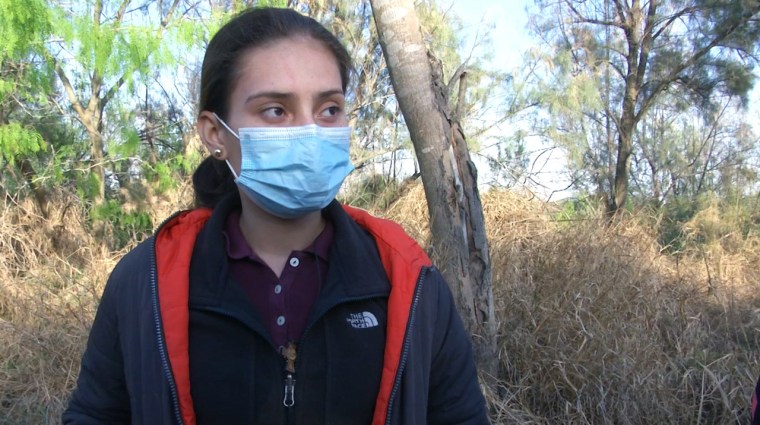
Her father left for the United States before she was born and now she's the one leaving her mom in Honduras before becoming an adult. It is common to hear that age, 17, among adolescents who cross alone. Their status as minors is a small measure of reassurance that they won't be returned to Mexico or deported to their countries.
Michelle crossed the border at sunset. She joined a group of 10 migrants who entered through the Mission, Texas, area. She keeps a wooden crucifix around her neck, and carries a plastic bag with a toothbrush and warm clothes.
“You cannot live in my country. There is a lot of crime. I want a future for myself,” she said, taking in the fact that she's in the U.S. Despite her youth, she made the trek alone, walking or taking buses.
"What I most want is to meet my dad"
History repeats itself for Joel, who's 17.
“I don't remember him [my father] at all. It's my dream to meet him,” he said, sitting on the side of the road where agents in Hidalgo, Texas, found him, along with other minors and migrant families. He came to ask for asylum.
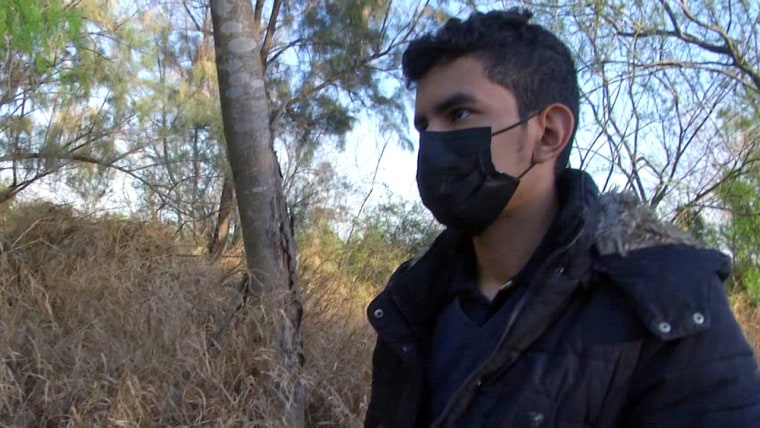
His father left Honduras when Joel was 4. Although he tries, he can't remember his dad. "He's been in contact with me and we would cry, hoping we could reunite." All of Joel's siblings are already on U.S. soil. He's the last child to say goodbye to their mother in Honduras.
He arrives with pain in his nostrils; Joel said it's because of the temperature changes. He carries a half gallon of water, saying it's his most important possession at that moment.
Along the way, he has met other lonely teenagers.
“You create those bonds of friendship, and you help each other," Joel said. "It's very tough, believe me, no sleep. We only sleep two hours, or only one, on the floor or on mats in shelters. Because of our lack of sleep, we get sick, and we have back or neck pain. We slept really close to one another.”
Reporters Caleb Olvera and Edgar Muñoz collaborated in reporting this story.
An earlier version of this article was originally published in Noticias Telemundo.
Follow NBC Latino on Facebook, Twitter and Instagram.
